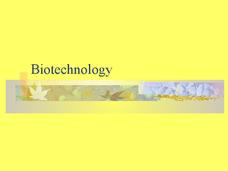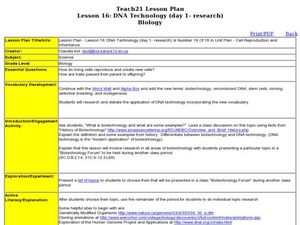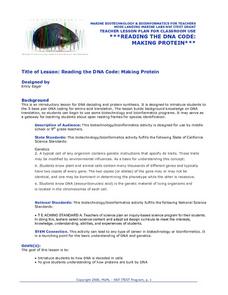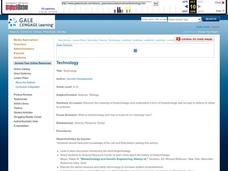Howard Hughes Medical Institute
Microarrays and Stem Cells
Background reading is available in the first two pages of this worksheet, along with reading comprehension questions and a laboratory activity in which students use mircroarray technology to identify genes used in cell differentiation....
American Museum of Natural History
Differentiate! The Stem Cell Card Game
Let the games grow. Groups play a card game to grow cells. Players start growing cells from stem cells to create specialized cells in the human body. Learners use full-grown cells from the human body to create stem cells in the lab to...
Curated OER
A Hard Sell on Stem Cells?
Students examine their prior knowledge of cell regeneration and therapeutic use of stem cells. After reading an article, they discover new techniques for deriving embryonic stem cells. In groups, they research on the different types of...
Howard Hughes Medical Institute
Classroom Activities: Stem Cells and Diabetes
How close are we to a cure for diabetes? It seems the cure which has a connection to stem cell research is a possibility! Learners explore the concept of stem cells with an engaging hands-on activity. A PowerPoint presentation provides...
Virginia Department of Education
Genetic Variation and Mutations
Young scientists demonstrate their creativity while completing several activities, to assess genetic variations and mutations. Instructors provide a list of options and scientists choose to write a comic strip, create a book, construct a...
Towson University
Mystery of the Crooked Cell
Can your class solve the Mystery of the Crooked Cell? Junior geneticists collaborate to learn about sickle cell anemia in a fascinating lesson plan. The included materials help them to examine the genetic factors behind the disease...
Curated OER
Stem Cells and Cloning
Students discuss an article on cloning and stem cells and complete an Internet cloning activity. In this genetic engineering lesson, students analyze stem cell issues by reading an article and participating in a class discussion. They...
Curated OER
Bioethics of Stem Cells
Students complete a variety of activities as they examine the ethics behind stem cell research and use.
Towson University
Mystery Disease
How did scientists determine the cause of illness before technology? Science scholars play the role of medical researcher in an engaging guided inquiry activity. Using observations, technical reading, and Punnett squares, learners...
Curated OER
Biotechnology
A continuous cascade of information comes through this PowerPoint on biotechnology. The topic is defined, a history is presented, and basic genetic engineering techniques are explained. The topic is covered in an objective manner,...
Teach Engineering
Don't Be a Square
If Parseltongue is a genetic trait, what is the probability a wizard will inherit the ability to speak Parseltongue? Scholars investigate magical and biological genetics with Punnett squares.
Curated OER
TE Lesson: What's Dominant?
Students study the number of chromosomes in the body cells, sperm cells, and egg cells of humans. They define allele, and examine the difference between dominant and recessive alleles. They complete an activity with jelly beans that...
Curated OER
Chromosomes
Students explore genetics, chromosomes and DNA. In this genetics lesson students design a chromosome and identify a family tree through genetics.
Curated OER
The Nash Case -- Identifying, Choosing and Using Genes
Students complete a variety of exercises as they examine the case of the Nash family who conceived one child in order to provide cells that may be used in a cell transplant for a dying sibling.
Curated OER
Plant Structure and Growth
This plant structure and function PowerPoint addresses the main organs and the factors that affect its development as well as going into detail about the specializations at a cellular level. The cell functions and system adaptations...
Curated OER
Cloning Around
Review concepts of cloning and genetic engineering and participate in a round-table discussion based on the ethics and potential of cloning with your class. Each learner then writes a formal essay on the topic, stemming from the debate.
Curated OER
Ethical and Personal Decisions
Students will learn about the current technology of genetic testing within the
framework of the biology curriculum through a lesson-produced PowerPoint presentation: "Genetic Testing" at: http://jbois.tripod.com/index.html.
Howard Hughes Medical Institute
Winogradsky Columns: Microbial Ecology in the Classroom
Winogradsky columns are ideal for observing the role of bacteria and other microorganisms in an ecosystem. This student activity guide is complete with data tables for observations and analysis questions for processing what was observed....
National Endowment for the Humanities
Albert Sabin and Bioethics: Testing at the Chillicothe Federal Reformatory
Do the ends justify the means? Getting a drug approved in the US is a long and involved process. But at some point out, it involves testing on humans. The ethics of such testing is the focus of a resource that uses Dr. Albert Sabin's...
National Nanotechnology Infrastructure Network
Help or Hype: The Ethics of Bio-Nanotechnology
Ethical concerns are not always black and white. A well-designed lesson presents learners with scenarios for which ethics may come into question. Scholars learn to consider the different sides of a situation and make an unbiased conclusion.
Curated OER
Lesson 16: DNA Technology
Students research different areas of biotechnology. In this biology instructional activity, students create a presentation about their research. They debate the topic presented and share their views on the subject.
Curated OER
Reading the Dna Code: Making Protein
Students study DNA decoding and protein synthesis. They use the amino acid table to translate DNA, break DNA strands into three nucleotide codes, and translate nucleotides into amino acid protein codes. They research the importance of...
Curated OER
Technology
Students recognize descriptions of different types of biotechnology currently being used. They form persuasive arguments for or against that particular type of biotechnology.

























